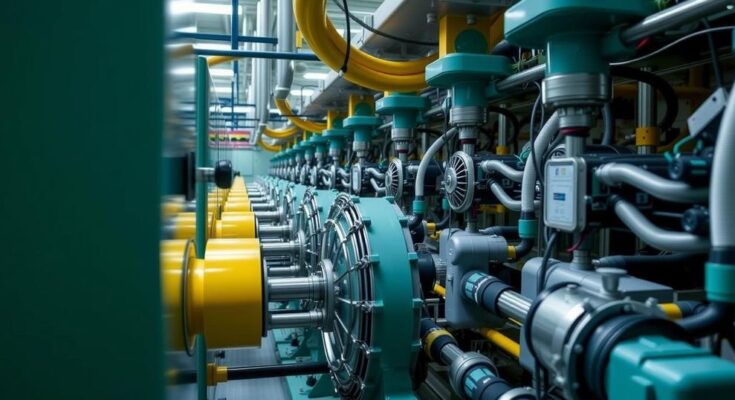Iran has announced the activation of new advanced centrifuges for uranium enrichment, a move criticized by the UN’s IAEA for Iran’s lack of cooperation. This development follows a recent IAEA resolution demanding better transparency from Iran regarding its nuclear activities. Amidst claims of pursuing peaceful nuclear energy, concerns persist over the potential for weaponization as Iran scales back its commitments to the 2015 nuclear agreement.
On Friday, Iran declared its intent to activate a significant number of advanced centrifuges as part of its ongoing nuclear program. This announcement coincided with criticism from the United Nations’ nuclear watchdog, the International Atomic Energy Agency (IAEA), which highlighted Iran’s lack of cooperation with its investigations. The move, according to Iran’s state news agency IRNA, aims to safeguard national interests and develop peaceful nuclear energy capabilities, notwithstanding the country’s reiterated denial of any intentions to pursue nuclear weapons.
The initiation of gas injection into these centrifuges marks a pivotal step in Iran’s uranium enrichment process. While Iran insists this program serves peaceful purposes, such advanced enrichment practices raise international concerns regarding potential weaponization. The IAEA recently passed a resolution mandating Iran to enhance its cooperation following troubling findings, including uranium traces at undeclared sites.
In response to the IAEA’s actions, Iran condemned the resolution as politically motivated, attributing it to external pressures from the United States and several European nations. Iranian authorities maintain they will fulfill pre-existing commitments to the IAEA while expressing intentions to respond appropriately to the resolution.
Significant concerns have been raised regarding Iran’s nuclear capabilities, with IAEA Director Rafael Mariano Grossi previously indicating that Tehran possesses enough enriched uranium for potential nuclear weapon development, should the decision be made. The situation is further complicated by Iran’s gradual withdrawal from commitments under the 2015 nuclear deal after the United States exited the agreement in 2018 and imposed renewed economic sanctions.
U.S. Secretary of State Antony Blinken recently noted that Iran’s timeline to produce weapons-grade material has significantly decreased, now estimated at one to two weeks. This duration represents the shortest breakout time known to U.S. officials, eliciting heightened apprehension about Iran’s nuclear agenda. Furthermore, Israeli Defense Minister Gideon Sa’ar expressed support for the IAEA’s resolution, underlining the international community’s collective aim to impede Iran’s nuclear aspirations.
The current tensions between Iran and the international community, particularly concerning its nuclear program, can be traced back to the 2015 nuclear agreement, known as the Joint Comprehensive Plan of Action (JCPOA). This accord placed stringent limits on Iran’s nuclear activities in exchange for sanctions relief. However, following the U.S. withdrawal from the deal in 2018 and the subsequent re-imposition of sanctions, Iran began to scale back its commitments, leading to increased enrichment activities and the installation of advanced centrifuges. The IAEA has been tasked with monitoring Iran’s compliance, yet ongoing political and diplomatic complexities continue to challenge effective oversight.
In summary, Iran’s recent announcement regarding the activation of advanced centrifuges signals a notable escalation in its nuclear activities in response to international criticism and pressures. This development raises alarm within the global community, particularly concerning the implications for non-proliferation and regional security. The situation remains dynamic, with the potential for further diplomatic confrontations and responses from Iran, highlighting the critical need for continued international engagement and oversight regarding its nuclear program.
Original Source: www.cnn.com




